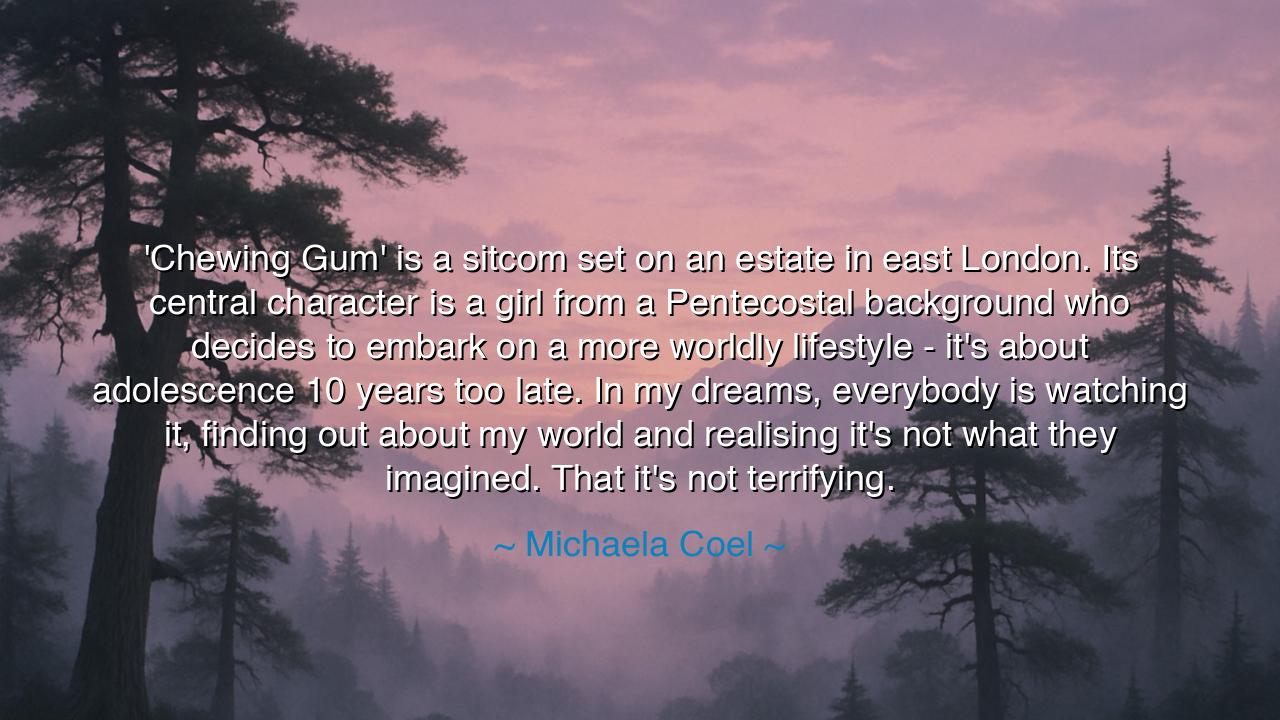
'Chewing Gum' is a sitcom set on an estate in east London. Its
'Chewing Gum' is a sitcom set on an estate in east London. Its central character is a girl from a Pentecostal background who decides to embark on a more worldly lifestyle - it's about adolescence 10 years too late. In my dreams, everybody is watching it, finding out about my world and realising it's not what they imagined. That it's not terrifying.






The words of Michaela Coel, both artist and truth-bearer, echo with the courage of one who dares to reveal her soul: “‘Chewing Gum’ is a sitcom set on an estate in east London. Its central character is a girl from a Pentecostal background who decides to embark on a more worldly lifestyle — it’s about adolescence 10 years too late. In my dreams, everybody is watching it, finding out about my world and realising it’s not what they imagined. That it’s not terrifying.” Within these words lies a deep yearning — the yearning to be seen, to be understood, and to be freed from the chains of misunderstanding that have long bound those who live at the edges of society.
Coel speaks not merely of a television show, but of a revelation. The estate in east London is more than a place; it is a symbol of a world often dismissed, caricatured, or feared by those who do not know it. And the girl at its center — caught between faith and freedom, between innocence and desire — becomes a mirror for all who have ever struggled to reconcile who they were taught to be with who they long to become. Her adolescence 10 years too late is the awakening of the human spirit after long dormancy, a delayed blossoming that comes when one finally gives oneself permission to live, to question, to laugh, and to love.
There is heroism in such awakening. The ancients would have called it a rite of passage — the moment when a soul, once confined by the laws of family, tradition, or fear, steps into the light of its own truth. In this, Coel’s story recalls the journey of Saint Augustine, who was raised in strict Christian devotion but wandered into the pleasures and contradictions of the world before finding wisdom through experience. Like him, Coel’s character does not reject her roots but seeks to understand them through the lens of lived life. Her journey, comic and tragic in equal measure, reminds us that true faith is not destroyed by curiosity; it is strengthened by honesty.
But beneath Coel’s humor lies a deeper wound — the wound of misrepresentation. For too long, the stories of Black women, of the poor, of the devout, and of the ordinary have been told not by those who live them, but by those who look upon them from afar. And so the world has imagined these communities as terrifying, their struggles as alien, their joys as strange. Through her work, Coel invites the world to see differently — to look beyond the walls of stereotype and into the shared humanity that binds us all. Her dream, that “everybody is watching,” is not a plea for fame, but for empathy.
This, then, is the sacred power of storytelling. It bridges the chasms of fear and ignorance, turning strangers into kin. When one voice dares to speak authentically, the world grows wider and gentler. Just as the ancient griots of Africa carried wisdom from village to village through song, Coel carries truth through laughter — revealing that even in the most overlooked corners of the city, there is beauty, humor, and light. What she gives us is not only entertainment, but a mirror, polished by honesty, in which we see both her world and ourselves reflected.
The lesson is clear: never fear to tell your story. What seems small, strange, or shameful within you may be the very thing that frees another from silence. Do not hide your roots, even when the world mocks them. Do not bury your questions, even when they come late. For every soul that speaks its truth becomes a lantern against the darkness of misunderstanding. When we dare to show our world, in all its imperfection, we remind others that the unknown is not terrifying — it is simply human.
So, to those who hear these words, take heart. Your world, too, is worth sharing. Speak of your beginnings, your doubts, your laughter, and your dreams. Tell the stories that no one else can tell, and tell them with courage. For one day, when others listen, they will see that what they feared was never monstrous — only misunderstood. And in that moment, as Michaela Coel dreamed, the walls between us will fall, and we shall all see each other clearly — not as strangers divided by circumstance, but as travelers on the same road toward understanding, truth, and love.






AAdministratorAdministrator
Welcome, honored guests. Please leave a comment, we will respond soon